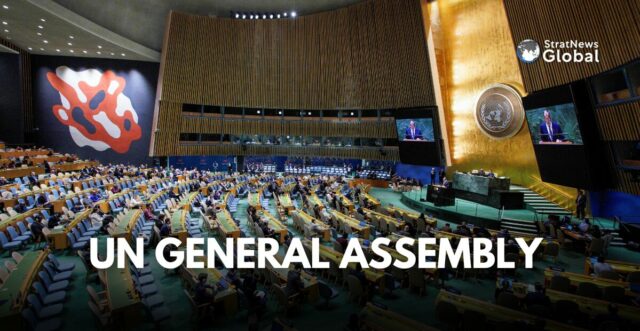Every September, world leaders convene in New York to speak at the start of the annual United Nations General Assembly (UNGA) session. This year’s session, marking the 79th UNGA, will feature six days of speeches starting Tuesday.
Who Speaks at the General Assembly?
When the United Nations was established in 1945, there were 51 founding members, a number that has since grown to 193. Non-member observer states, such as the Holy See and the State of Palestine, along with the European Union, are also permitted to address the assembly.
It is a long-standing tradition for Brazil to speak first. This custom dates back to the early years of the UN when Brazil consistently volunteered to open the session when others hesitated. As the host country, the United States follows Brazil in addressing the assembly.
From there, the list of speakers follows a general order based on hierarchy and the timing of requests. Heads of state speak first, followed by deputy heads of state, heads of government, ministers, and other lower-ranked officials. This year, 87 heads of state, three vice-presidents, two crown princes, and 45 heads of government are among those expected to speak.
Speech Duration and Notable Exceptions
Speeches at the General Assembly are expected to last around 15 minutes, although some leaders have historically exceeded this limit. For example, Cuban leader Fidel Castro delivered a four-and-a-half-hour speech in 1960, while Libyan leader Muammar Gaddafi spoke for more than an hour and a half in 2009.
Key Issues to Be Addressed
Although each year’s General Assembly has an official theme, leaders often focus on their own pressing concerns. This year’s theme is “Leaving no one behind: acting together for the advancement of peace, sustainable development, and human dignity for present and future generations.” However, several key topics are expected to dominate discussions.
1. The War in Gaza
The ongoing conflict between Israel and Hamas is likely to be a major focus. Since October 2023, the war has claimed over 41,000 lives, according to local health authorities. Leaders are expected to call for a ceasefire and address the worsening humanitarian crisis.
2. Ukraine War
The conflict in Ukraine, which has lasted more than two and a half years, will be another prominent topic. Many leaders are expected to renew calls for peace and an end to the Russian invasion. Ukrainian President Volodymyr Zelenskiy is set to address the assembly, while Russian Foreign Minister Sergei Lavrov will speak later in the week.
3. Climate Change
Leaders from island nations and countries most affected by climate change are expected to push for urgent action to limit global warming. The growing impacts of climate change on vulnerable populations will be a key part of the conversation.
4. UN Security Council Reform
Calls for reforming the UN Security Council will likely feature in speeches from countries such as Brazil, Germany, India, and Japan. These nations, along with others, have been advocating for changes to the Council’s structure, including the possibility of adding new permanent members and limiting the use of vetoes.
Summit of the Future
Before the formal speeches begin, the United Nations will host a two-day Summit of the Future on September 22-23. The summit aims to address governance challenges for modern issues like artificial intelligence, with U.N. Secretary-General Antonio Guterres pushing for ambitious reforms of international institutions such as the UN Security Council, the World Bank, and the International Monetary Fund.
(With Inputs from Reuters)
Research Associate at StratNewsGlobal, A keen observer of #China and Foreign Affairs. Writer, Weibo Trends, Analyst.
Twitter: @resham_sng





